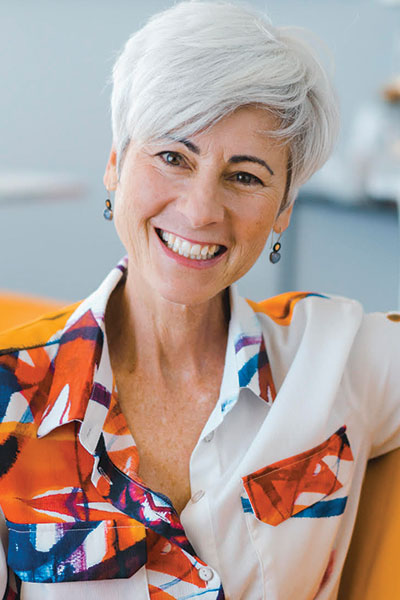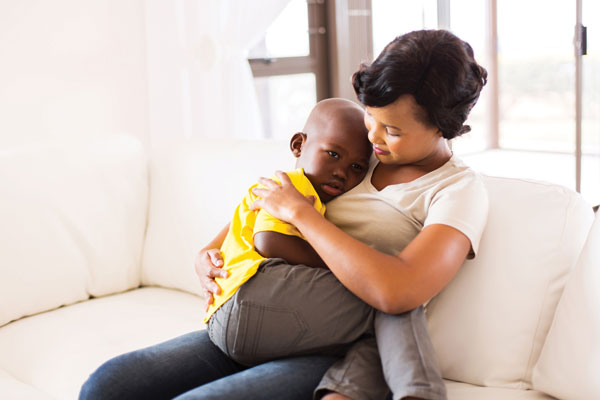How to Have ‘The Cancer Talk’ with Children
by Eva Grayzel
Has someone in your child’s life been diagnosed with cancer? Whether it’s a parent, classmate, or a neighbor, when someone a child cares about has cancer, the scary part for them is the unknown. Talking with your kids about cancer can go a long way in calming their fears and helping them develop coping skills.
Being concise and using proper terms helps reduce confusion and misunderstanding.
Explaining cancer to kids is a challenging, yet important, conversation. Here are some tips to help you have “The Cancer Talk” with your child.
Find the right time to talk. Choose a time earlier in the day when neither you nor your child is tired, hungry, or rushed. Find a place to talk where there won’t be many distractions.
Be honest and clear, yet optimistic. For example, you can say, “I have lung cancer. I’m getting three kinds of treatment. I’ll be unwell for a few months, but the doctors think I will make a full recovery.” If you’re too vague and say something like, “Mommy is sick and needs medicine,” this may confuse your child, and they may think a simple cold or a low-grade fever is the same as having cancer. Being concise and using proper terms helps reduce confusion and misunderstanding. It also empowers your child with language they can use when schoolmates or teachers ask about their loved one with cancer.
Identify your child’s emotions. Help a child identify how they feel by asking questions: Do you feel sad because I’m sick? Angry because I don’t have energy to play? Confused about what is hap pening with me? Jealous of kids who don’t have a sick parent? Fearful about losing me? If the feelings are never named, validated and discussed, the child may live with constant anxiety, confusion, and frustration. Talking about emotions helps children see their world clearly and understand it.
Beware Keeping Cancer a Secret
As a parent, you may be tempted to hide a cancer diagnosis to protect your children from distressing news. However, avoiding the topic may do more harm than good. Children are very perceptive, and they can tell when something is wrong.
When you don’t include children in “The Cancer Talk”:
- You endorse secrecy and dishonesty.
- You miss an opportunity to teach empathy and the value of family.
- You disregard their feelings.
- You risk making them even more afraid, as what a child imagines is often much worse than the reality.
- You risk a lifetime of unintended anger.
Remind your child that their feelings matter. Tell them it’s OK to feel the way they do. Listen to them when they tell you how they feel, and try to understand their perspective. Reassure them it’s not their fault you are sick. Promise them you are doing your best to get better. Let them know your plan to keep their daily routines as normal as possible. Take note of changes in your child’s behavior. Things like moodiness, irritability, withdrawing from friends or activities, excessive baby talk, unusual headaches or stomachaches, trouble sleeping, and difficulty focusing are all just unaddressed feelings surfacing, begging for attention.
Show a willingness to discuss their loved one’s cancer with them as often as they like. Find a book about cancer to read together. Let them know whom they can call if they want to talk to someone other than you. Connect them with a social worker, school counselor, or hospital family program to help them cope if needed. Keeping the lines of communication open builds trust, promotes emotional healing, and can help your child feel less alone.
Let your child know what they can do to help. Request simple tasks, and reward good behavior. For example, “I would appreciate if you wash your hands thoroughly while my immune system is compromised.”
Most importantly, voice your gratitude. Let your children know how thankful you are for everything in your life that cancer cannot take away. Sharing gratitude will not only help you stay positive, but it will help your child as well.

Eva Grayzel is a motivational speaker, oral cancer survivor, and cancer survivor advocate. She is the author of two children’s books that aim to minimize fear and promote dialogue around cancer and has published “My Story Legacy,” a guide to help people document their personal stories, life values, and wisdom. To learn more about Eva, you can find her on Facebook, Twitter, and Instagram (@evagrayzel) or visit EvaGrayzel.com.


